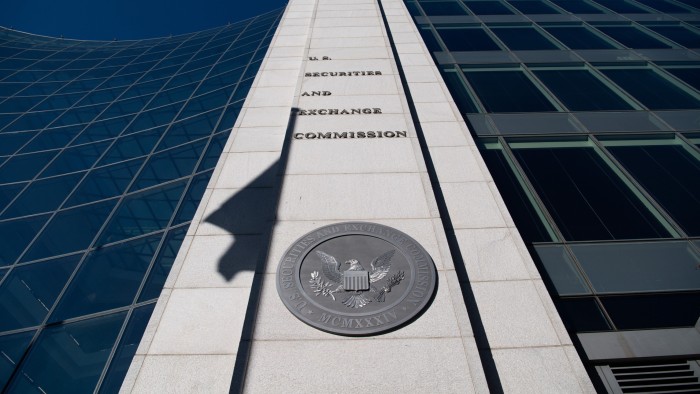SEC should reconsider proposed rules on capital lock-ups

Roula Khalaf, Editor of the FT, selects her favourite stories in this weekly newsletter.
The writer is professor of finance at the graduate school of business at Stanford
To maintain financial stability and protect investors, it is critical that companies dealing in government securities are well capitalised at all times.
That seems a clear and obvious goal for regulators. But changes to regulations proposed by the Securities and Exchange Commission may have unintended consequences in this regard, potentially damaging the world’s most important financial market.
Much of the attention over the SEC’s rule changes so far has focused on the proposed expansion of the definition of a “government securities dealer”, drawing complaints from the likes of BlackRock and Citadel.
If a firm buys or sells enough US Treasuries within a given period of time, the SEC proposes to classify it as a dealer, subject to all of the associated capital, reporting and other requirements. Some commenters (including me) believe that a quantity threshold, on its own, is inappropriate. That rule could capture firms that aren’t actually in the business of providing liquidity to the market, a standard criterion for being considered a dealer.
But the main concern I have raised in a comment submission on the SEC proposals is the potential adverse implications for Treasury market liquidity of putting the newly registered dealers under an existing “capital lock-up” rule. This rule states that a capital contribution to a dealer does not count towards its regulatory capital if it is withdrawn within a year.
This lock-up could exacerbate episodes of market dysfunction, which will probably become more frequent and severe given the burgeoning size of the Treasury market relative to the capacity of the dealers to cope with the volumes of trading.
Some of the firms that will be required by the SEC to register as government securities dealers rely for capital on parent companies that have other trading businesses.
A parent has the option to move, or downstream, capital to its trading subsidiaries opportunistically, whenever market conditions suggest that expected returns are higher, relative to risk.
If a subsidiary becomes registered as a government securities dealer, then capital downstreamed to that business must not be redeemed for at least a year if it is to be taken into account for regulatory capital requirements.
Thus, to make efficient use of its capital, the parent is likely to choose to trap less of its funds in its government securities dealer.
As a result, when US Treasury market liquidity deteriorates, as happened in the Covid shock of March of 2020, we can expect less capital to be committed to the US Treasury market by firms that must newly register as government securities dealers. Further, capital formation by hedge funds and principal trading firms with separately capitalised trading businesses would probably also be reduced.
As a simplified illustrative example, suppose a parent has trading subsidiaries A and B that are not regulated as dealers. In March of a given year, a supply shock presents a significant profit opportunity for firm A. The parent transfers $100mn of capital to firm A to backstop risky new positions.
By April, the positions that were added by firm A in March are liquidated and $100mn of capital is returned to the parent. Then, in June, a big profit opportunity for firm B leads the parent to downstream $100mn of capital to B. Had firm A been subject to the SEC’s capital lock-up rule, however, this flexible approach to deploying parent capital would not be possible.
The $100mn capital contribution to firm A would not count towards the regulatory definition of capital for the business unless it stays with it for a year. Aware of this in March, perhaps the parent would have invested only, say, $40mn of its capital in firm A. This would leave $60mn of discretionary parent capital available to address new profit opportunities for firms A and B at later points in time over the subsequent year.
I think the SEC is right to expand the definition of a dealer. However, the commission may also want to consider an amendment to its capital lock-up rule. It should allow capital contributions to count towards the definition of regulatory capital even if withdrawn within a much shorter period of time than one year, provided that the dealer meets its other capital requirements.
I do not see a good case for requiring contributions of capital to remain in a dealer long after they are needed to buffer actual solvency risks. This is a chance for the SEC to reconsider the impact of its rules on Treasury market liquidity.
Comments